Related Research Articles
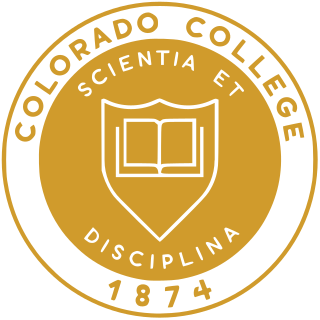
Colorado College is a private liberal arts college in Colorado Springs, Colorado. It was founded in 1874 by Thomas Nelson Haskell in his daughter's memory. The college enrolls approximately 2,000 undergraduates at its 90-acre (36 ha) campus. The college offers 42 majors and 33 minors. Notable alumni include Liz Cheney, Dutch Clark, Thomas Hornsby Ferril, James Heckman, Steve Sabol, Ken Salazar, and Marc Webb.
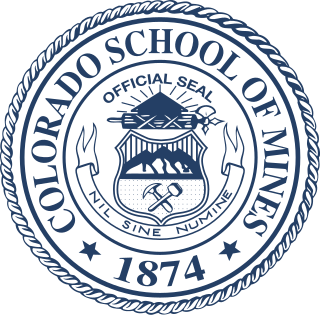
Colorado School of Mines (Mines) is a public research university in Golden, Colorado founded in 1874. The school offers both undergraduate and graduate degrees in engineering, science, and mathematics, with a focus on energy and the environment. While Mines does offer minor degrees in the humanities, arts, and social sciences, it only offers major degrees in STEM fields, with the exception of economics. In the Fall 2023 semester, the school had 7,101 students enrolled, with 5,443 in an undergraduate program and 1,658 in a graduate program. The school has been co-educational since its founding; however, enrollment remains predominantly male. It is classified among "R1: Doctoral Universities – Very high research activity".

Colorado State University is a public land-grant research university in Fort Collins, Colorado. It is the flagship university of the Colorado State University System. Colorado State University is classified among "R1: Doctoral Universities – Very high research activity". It was founded in 1870 as Colorado Agricultural College, and in 1935 was renamed the Colorado State College of Agriculture and Mechanic Arts. In 1957, the Colorado General Assembly approved its current name, Colorado State University.

The University of Denver (DU) is a private research university in Denver, Colorado. Founded in 1864, it is the oldest independent private university in the Rocky Mountain Region of the United States. It is classified among "R1: Doctoral Universities – very high research activity". DU enrolls approximately 5,700 undergraduate students and 7,200 graduate students. The 125-acre (0.51 km2) main campus is a designated arboretum and is located primarily in the University Neighborhood, about five miles (8 km) south of downtown Denver. The 720-acre Kennedy Mountain Campus is located approximately 110 miles northwest of Denver, in Larimer County.
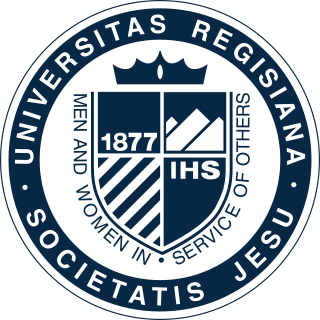
Regis University is a private Jesuit university in Denver, Colorado. Founded in 1877 by the Society of Jesus, the university offers more than 120 degrees through 5 colleges in a variety of subjects, including education, liberal arts, business, nursing, and technology. It is accredited by the Higher Learning Commission.

Auraria Campus is an educational facility located near downtown Denver, Colorado in the United States. The campus houses facilities of three separate universities and colleges: the University of Colorado Denver, Community College of Denver (CCD), and Metropolitan State University of Denver. In 2017, there were approximately 54,812 students between the three schools, with rapid growth projected over the following few years. However, due to Covid and declining enrollment, the collective student population in 2022 was approximately 38,000, with an additional 5,000 faculty and staff.

Western Colorado University (Western) is a public university in Gunnison, Colorado. It enrolls approximately 2,600 undergraduate and 400 graduate students, with 25 percent coming from out of state.

Colorado Technical University (CTU) is a private for-profit university with its main campus in Colorado Springs, Colorado. The university is owned by Perdoceo Education Corporation. Founded in 1965, CTU offers undergraduate, graduate, and doctoral degrees, primarily in business, management, and technology. About 92% of Colorado Tech's students are fully online. According to Colorado Tech, the university has conferred more than 118,000 degrees worldwide. Colorado Tech has no public or official affiliation with the State of Colorado.
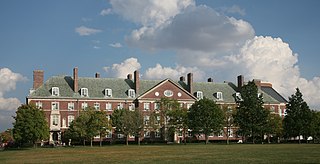
The University of Illinois Urbana-Champaign's College of Agricultural, Consumer and Environmental Sciences (ACES) is part of the University of Illinois Urbana-Champaign. Most of the ACES buildings are located on the South Quad. In terms of staff, ACES has 186 tenure-system faculty, 78 specialized faculty, 26 postdoctoral researchers, 493 academic professionals, 565 civil service staff, 323 assistants, and 956 hourly employees.
The University of California, Davis College of Biological Sciences was established in 2005 and is one of four colleges and five schools on the campus of the University of California, Davis. Davis is the only UC campus that boasts a college dedicated solely to the study of biology, and is one of the only universities in the US to have such an institution. The college offers ten undergraduate majors and six minors, and has eight interdisciplinary graduate groups. The majors housed in the CBS were previously part of the Division of Biological Sciences since 1971.

The Rocky Mountain Biological Laboratory is a high-altitude biological field station located near Crested Butte, in the abandoned mining town of Gothic, Colorado in the West Elk Mountains. The laboratory was founded in 1928. Research areas include the ecology of the region, climate change, pollination biology, and a long-running study of the yellow-bellied marmot. The laboratory offers courses for undergraduate students, including National Science Foundation-funded REU students, and provides support for researchers from universities and colleges.

The University of Colorado Anschutz Medical Campus is the academic health sciences campus in Aurora, Colorado that houses the University of Colorado's six health sciences-related schools and colleges, including the University of Colorado School of Medicine, the CU Skaggs School of Pharmacy and Pharmaceutical Sciences, the CU College of Nursing, the University of Colorado School of Dental Medicine, and the Colorado School of Public Health, as well as the graduate school for various fields in the biological and biomedical sciences. The campus also includes the 184-acre (0.74 km2) Fitzsimons Innovation Community, UCHealth University of Colorado Hospital, Children's Hospital Colorado, the Rocky Mountain Regional Veterans Affairs hospital, and a residential/retail town center known as 21 Fitzsimons. CU Anschutz is the largest academic health center in the Rocky Mountain region.
Kristi S. Anseth is the Tisone Distinguished Professor of Chemical and Biological Engineering, an Associate Professor of Surgery, and a Howard Hughes Medical Investigator at the University of Colorado at Boulder. Her main research interests are the design of synthetic biomaterials using hydrogels, tissue engineering, and regenerative medicine.

The University of Colorado Denver is a public research university located in downtown Denver, Colorado. It is part of the University of Colorado system. Established in 1912 as an extension of the University of Colorado Boulder, CU Denver attained university status and became an independent institution in 1973. CU Denver is the largest research university in Colorado, and is classified among R1: Doctoral Universities - Very High Research Activity. The university's graduate programs award more master's degrees than any other institution in the state, serving roughly 5,000 students annually.
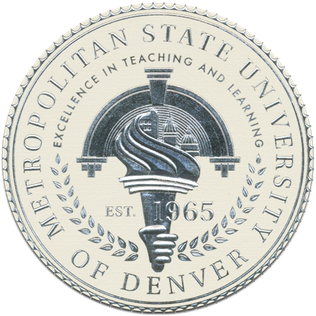
Metropolitan State University of Denver is a public university in Denver, Colorado. It is located on the Auraria Campus, along with the University of Colorado Denver and the Community College of Denver, in downtown Denver, adjacent to Speer Boulevard and Colfax Avenue. MSU Denver had an enrollment of 15,682 students in the fall of 2022.
Charles Musgrave is an American chemist, engineer and materials scientist. He won the 1993 Foresight Institute Feynman Prize in Nanotechnology.

Phyllis M. Wise is a biomedical researcher. Most recently, she is serving as the inaugural Chief Executive Officer and President of Colorado Longitudinal Study.

Diana Harrison Wall is the founding director of the School of Global Environmental Sustainability, a distinguished biology professor, and senior research scientist at the Natural Resource Ecology Laboratory at Colorado State University. She is an environmental scientist and a soil ecologist and her research has focussed on the Antarctic McMurdo Dry Valleys. Wall investigates ecosystem processes, soil biodiversity and ecosystem services and she is interested in how these are impacted by global change. The Wall Valley was named after her in recognition of her research in the McMurdo Dry Valleys. Wall is a globally recognised leader and speaker on life in Antarctica and climate change.
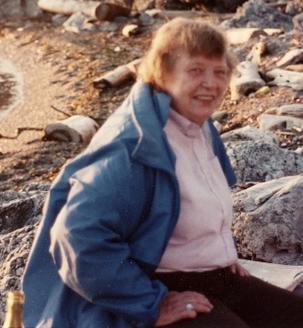
Patricia Louise (Pat) Dudley (1929–2004) was an American zoologist specializing in research of copepods. An early pioneer using an electron microscope to study copepod organs and tissues, she taught at Barnard College for 35 years and served as Chair of the Biological Sciences department. Dudley was a National Science Foundation faculty fellow. She donated funds to establish the Patricia L. Dudley Endowment at Friday Harbor Labs, where she conducted research.
Karen Irene Winey is an American materials scientist and chair of the University of Pennsylvania department of materials science and engineering.
References
- ↑ Slipher, David (2017-10-02). "Mark Winey". College of Biological Sciences. Retrieved 2021-11-12.
- ↑ "Mark Winey". aaas.org. Retrieved April 26, 2017.
- ↑ "Mark Winey". colorado.edu. Retrieved April 26, 2017.
- ↑ "Mark Winey". ucdavis.edu. Retrieved April 26, 2017.